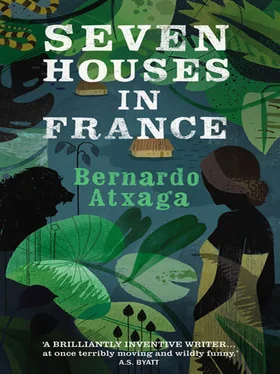Saint-Foix immediately corrected what he had said to the journalist.
‘Leave out that part about “like two loyal knights at the service of a queen”. It’s too vulgar. And add any other details you think fit: “The African continent, so far and yet so near, etc., etc.”’
His voice and tone were again those of a real ogre. Ferdinand Lassalle nodded and got to his feet. ‘Thank you, Armand.’
The Duke remained seated and replied only with a smile. He had put down his glass of lemonade and was holding a long, thin cigar, as yet unlit. ‘By the way, congratulations on those articles of yours about the Foreign Legion. You deserved that prize.’
Deeply flattered, the journalist gave a polite bow and withdrew.
A couple of hours later, the news was already doing the rounds. The following day, it appeared on the front pages of all the most important newspapers in Brussels, Paris and Rome, and three days later, in La Gazette de Léopoldville .
THE REPORT ABOUT the royal journey, published in La Gazette de Léopoldville , caused a great stir in Yangambi, and, more particularly, in the mind of Captain Lalande Biran. Duke Armand Saint-Foix and he had been close friends ever since, years before, on the occasion of the publication of Dix poètes belges , the Captain had inveighed against the editor’s failure to include the Duke’s work in the anthology, crying: ‘You either include both of us or neither,’ adding vehemently, ‘I don’t know Saint-Foix personally, but I know his poems, and I wish to make it quite clear that if there are any great poets in Belgium today, he is one of them. Saint-Foix is on a par with any poet from Paris. Let there be no doubt about it, he must be included in the anthology.’
This praise was quite sincere, for, at the time, Lalande Biran had never met Saint-Foix and was unaware that he was very close to the King. The Duke was unaccustomed to receiving such sincere praise, and the incident, so to speak, touched his heart. Even better, Lalande Biran was not particularly tall, barely five foot nine in his boots. It was a pleasure to be with him and to be able to admire his eyes d’or et d’azur .
In the end, the anthology was entitled Onze poètes belges , and Saint-Foix and Lalande Biran mingled poems and blood like two adolescents. Time consolidated their friendship. This was partly because of their shared metaphysics, their poetic tastes and their love of gambling, and partly because of a shared interest in the physical world. Ever since Lalande Biran had left for Africa, they had been partners in the trafficking of mahogany and ivory, a highly profitable business that bound them ever closer.
It was a very evenly balanced relationship. Lalande Biran, who had flown higher in the fields of poetry and gambling — having published more books and suffered greater economic upsets — was the more complete artist, being a gifted draughtsman and painter as well. On the other hand, Saint-Foix was a master of the non-metaphysical world. Without his collaboration, it would have been impossible to smuggle the mahogany and ivory into Europe, and Lalande Biran would never have been able to pay off his gaming debts or been able to buy the seven houses that his wife, Christine, longed to own in France.
In his letters, Saint-Foix called Lalande Biran ‘Moustachu’, because, when they first met, the Captain had sported a magnificent moustache, which he had shaved off when he arrived in Africa. For his part, Lalande Biran called Saint-Foix ‘Toisonet’, a play on ‘ toiser ’, to gauge someone’s height, as the diminutive Duke frequently did, and ‘ toison d’or ’, because at official receptions, the Duke made a point of wearing the sash of the Order of the Golden Fleece.
These forms of address were significant. In Yangambi, everyone had to call the Captain by his full name, Lalande Biran, or by his rank, ‘Captain’; even Van Thiegel, his second in command and his colleague in the complex business of mahogany and ivory trafficking, had to call him ‘Captain’ or, at most, over supper or when they swam together in the river, ‘Biran’. On the other hand, anyone could call Armand Saint-Foix ‘Armand’, because he liked to hear his name on other people’s lips; however, any member of Court who called him Toisonet in public might as well start packing his bags at once. Indeed, it was said in Brussels that certain ministers had lost their post after committing that very blunder.
Mon cher Toisonet , began Lalande Biran’s letters. Mon cher Moustachu , said those from Saint-Foix. Month after month, year after year, the letters formed a chain, so that by 1904, the year in which King Léopold announced his visit to the Congo, they considered themselves to be more like brothers than friends.
Lalande Biran read the article in La Gazette de Léopoldville in the garden behind Government House. His first reaction was one of surprise — an American queen for the Belgian Congo? — his second was one of excitement. What if they were to stop off in Yangambi? If, on their way to the Stanley Falls, the King and his entourage were to pause in Yangambi, would that not be a great opportunity for him?
He gazed out at the landscape. Before him lay miles and miles of jungle bisected by a dark line, like a wound. The line — or wound — grew wider as it approached Yangambi, where it revealed its true nature: it was the Great River, the oft-mentioned River Congo.
Lalande Biran followed its course with his eyes. When it reached Yangambi and was joined by the waters of the Lomami, the current flowed much faster on the jungle side, beyond the small mid-stream islands, and far more slowly on the village side. Over time, that quiet water had formed the beach where the first colonists in Yangambi had built the wooden platform that served as a jetty. There the Princesse Clémentine , the Petit Prince , the Roi du Congo and all the other steamships docked. Why shouldn’t the royal boat do the same? He must put this suggestion to Toisonet as soon as possible.
Lalande Biran could already see himself standing to attention on that beach, ready to salute the King. Then he pictured the King, an erect figure at the prow of the boat, returning his salute. It was a white steamship, with five funnels, larger than the Princesse Clémentine and the other boats that came to Yangambi. A huge blue flag with a single yellow star fluttered on the mast. Now and then, the flag would belly out in the breeze.
Rocking back and forth in his chair, Lalande Biran imagined the full-page account of the royal expedition that would appear in all the newspapers of Europe, and he imagined, too, the large photo that would illustrate it. In the middle, Belgium’s tallest palm tree; beside him, holding his arm, the dancer from Philadelphia; to her left, at the end, himself; on the other side, the explorer Stanley and Toisonet. He saw the caption as well: ‘King Léopold on a lion hunt in the heart of the jungle’.
This wasn’t pure imagination. Someone — possibly Toisonet — had told him that the one trophy missing from Léopold II’s hunting pavilion was a lion’s head, and that sometimes this gap in his collection plunged him into gloom, if not envy. And this was understandable. His cousins and other members of the family, representatives of the Spanish and English nobility, had more magnificent collections of foxes and wolves and bears than he did, but if he could bag the head of the king of the jungle, he would be the undisputed champion.
Lalande Biran was not as good at numbers as the King. He liked to say, half-joking and half-serious, that he was ‘too much of a poet’ for such things, and that it was his wife, Christine, who kept the accounts. Despite this, it was as clear as day that if the royal party did stop in Yangambi and the King managed to kill that other king, the king of the jungle, this would be of great personal advantage to Lalande Biran. Perhaps a position at Court, with Toisonet, or in the administration, in the Ministry of Culture. Or perhaps at the embassy in Paris, in charge of cultural affairs, a post that would help fulfil his life-long dream, to become an habitué of Paris’s literary cafés.
Читать дальше












